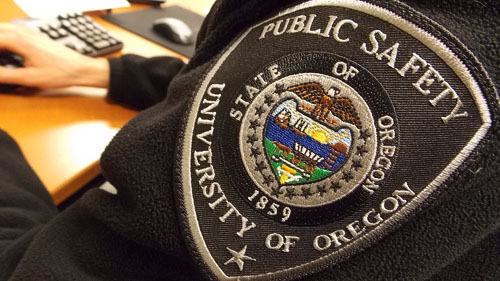Every college campus in Oregon has a different model for its campus security. Is one of them right for Portland State? Comparing the structures of public safety on other campuses may
Oregon campuses strive for safety in different ways

Every college campus in Oregon has a different model for its campus security.
Is one of them right for Portland State?
Comparing the structures of public safety on other campuses may help shed some light on which model of campus public safety and law enforcement is best suited for the PSU community.
Each school has a slightly different model because of their individual requirements, said Di Saunders, director of communications for the Oregon University System.
“Each campus has adapted to their environment to meet their needs,” she said.
For example, Oregon State University has contracted with the Oregon State Police to partner with their own public safety department since 1989; the University of Oregon implemented its own firearm-free campus police department on Jan. 1, 2012; and the La Grande Police Department is located across the street from Eastern Oregon University to assist with the university’s own campus security when and if they are needed.
EOU’s situation is convenient but obviously wouldn’t work for the PSU community or the Portland Police Bureau since both organizations are already established in their own areas of Portland.
UO made the decision to form its own campus police department after the Oregon Legislature passed a bill allowing colleges and universities to create their own police departments in the fall of 2011. UO was the first university in Oregon to take advantage of this opportunity.
UO had previously contracted with the Eugene Police Department, and was supposed to have a patrol sergeant and two police officers on campus, but this proved to be a challenge because EPD was understaffed, said Phil Weiler, assistant vice president of strategic communications at UO.
“We [started researching] and found that of Pacific-12 Conference universities, [more] than 95 percent had their own university police departments. We were in the minority,” he said.
Once the decision was made to create a university police department, UO had to figure out what kind of service it wanted to provide.
“Policing a college campus is different than policing in the broader community,” Weiler said.
The issue of arming UO’s police officers is still under discussion.
“When we requested permission to form our own police department, we specifically did not want to arm officers at that moment, and we let the Oregon Board of Higher Education know our intent was to come back at a later date to present the issue of arming officers,” Weiler said.
UO is in the process of holding a series of forums on campus for students, faculty and staff to continue the dialogue about arming police officers. Currently, the authority of the University of Oregon Police Department is limited to UO-owned property.
OSU has contracted with OSP to partner with their department of public safety for 24 years. This started as a temporary solution to an issue that surfaced in 1989, said Lieutenant Chuck Yutzie of OSU’s department of public safety.
“The officers had been specially deputized by the Benton County Sheriff’s Office in order to be able to perform law enforcement services, but they weren’t part of the sheriff’s office,” Yutzie said. “There was a change of command [in the sheriff’s office], and since there was no control over those commissions that had been given, they were pulled.”
Intended as a short-term fix to the problem, Oregon’s governer at the time, Neil Goldschmidt, put OSP in charge of campus security at OSU, and they’ve been there ever since.
Some of the benefits of having OSP on campus include having access to the OSP crime lab and the OSP bomb squad, and if additional officers are needed, they’re just a phone call away, Yutzie said.
“It worked out so well, [the university] never thought of changing it. We have no complaints,” he said.
As far as contracting with Portland Police Bureau or OSP, Campus Public Safety Office Chief Phil Zerzan said he is open to alternatives [of transitioning to a sworn law enforcement agency] but points out this particular issue is more complex than requesting one of these agencies to contract with PSU.
“PPB might not have the manpower [to dedicate to PSU], and that can cause problems with response times,” he said. “OSP would have to want to contract with PSU and their model with OSU is [simpler] because of the definitive boundaries of OSU’s campus.”
This leaves PSU with two options: having CPSO continue functioning the way it is now or forming a campus police department, Zerzan said.
“There are clearly understandable service gaps in what we’re doing now,” he said. “If we make that decision [to create a campus police department] we would train officers and equip them to do their job safely.”







UO was actually the second university to create their own police department–OHSU did it a couple years ago.
“UO is in the process of holding a series of forums on campus for students, faculty and staff to continue the dialogue about arming police officers. Currently, the authority of the University of Oregon Police Department is limited to UO-owned property.”
That “dialogue” is a complete waste of time. Police officers carry guns, period. What is there to discuss? Also, peace officers (which is what the UO police are) have statewide jurisdiction, so their authority is not limited to campus property.
To Vanguard: Is there a place where students can follow the discussion? I have seen flyers about public discussions regarding adding an official police force/firearms to PSU but do not know of a central place to find information regarding the issue. Also, if the Vanguard finds out about the next public discussion- I hope it will be published before the fact. Thank you!!
To Eamon: no dialogue is a waste of time unless you support dictatorship-like rule.